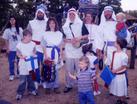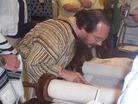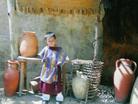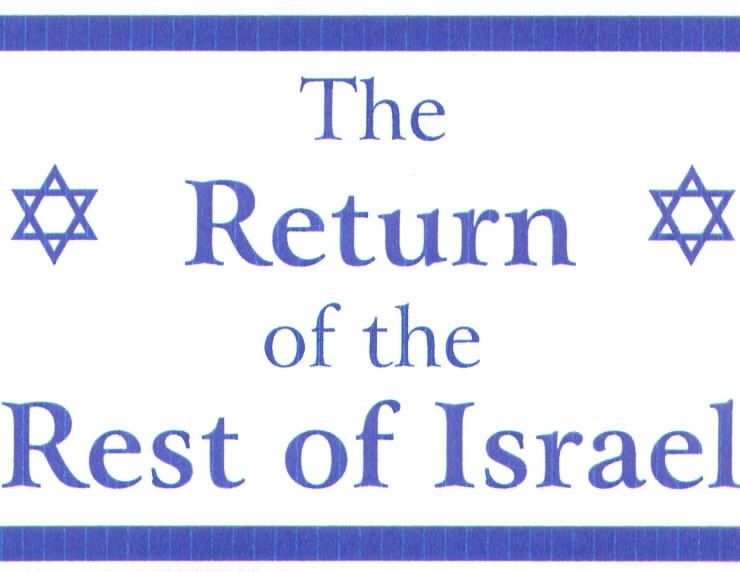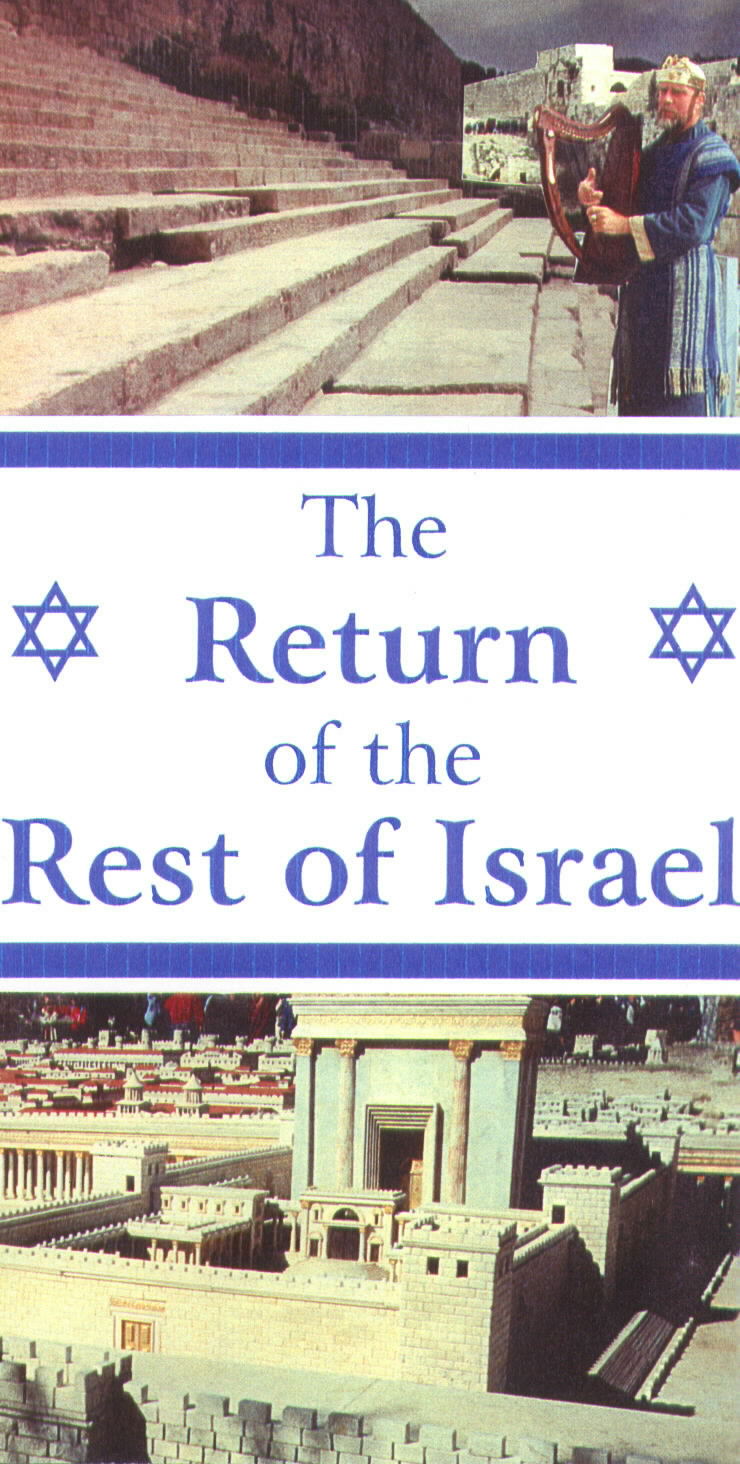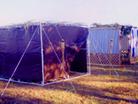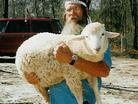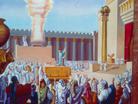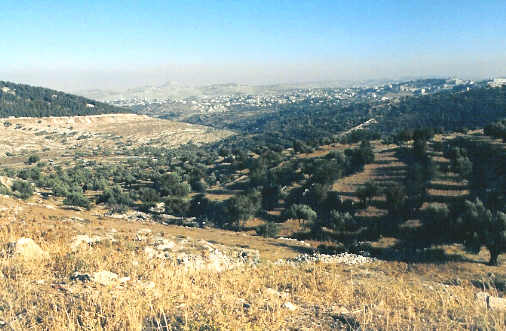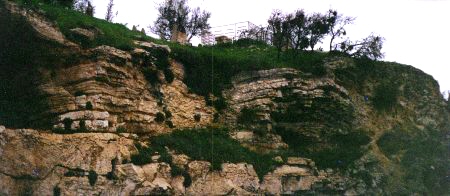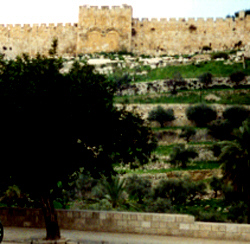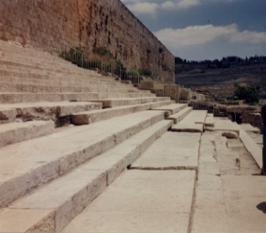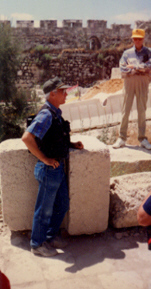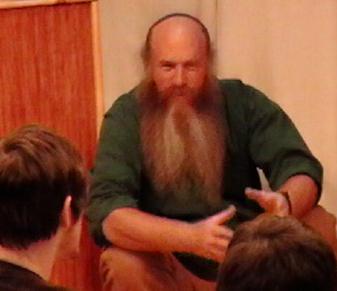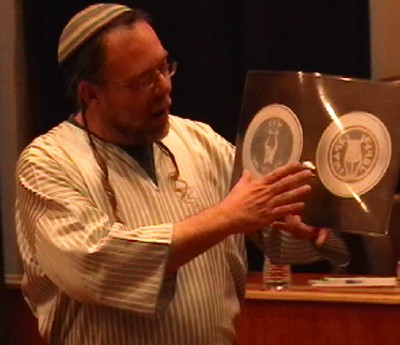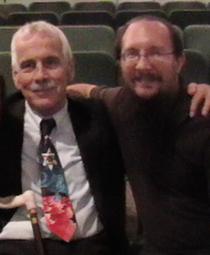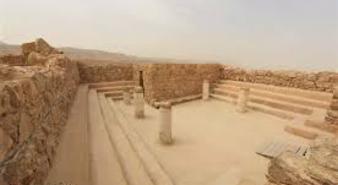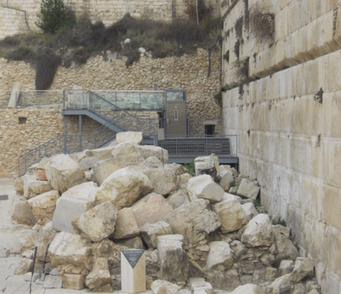From the darkest of wars there arose a new nation,
Born in a day, yet from such a deep well!
A long-slumbering land now awakened with vigor,
Proclaiming its name was--again--"Israel".
In wonder we watched, and we thanked our Creator
That He had allowed us to see such a day.
We knew that the end of the age was upon us,
But we never imagined the part we would play...
Many have recognized the unparalleled preservation of the Jewish people despite so many attempts to obliterate them, and their unprecedented return to their own land after nearly 2,000 years of exile, as proof that our Creator keeps His promises.
But that's not the whole story.
The same Scriptures that tell us about the Exodus from Egypt also say that one day the recalling of Israel from among all nations will eclipse the first exodus so overwhelmingly that we'll hardly even talk about it anymore! (Jer. 16:14-15)
Now, the Jews no longer have to end Passover by saying, "Next year in Jerusalem!" They can already move back if they so choose. But the Passover seder hasn't changed. And the population of Israel is not much different than it was after Joshua conquered the Land. This means there's something even bigger still to come!
A clue as to just what is found in the fact that Ezekiel was told his vision of the dry bones represented the restoration of "the whole House of Israel". (37:11)
At the time he prophesied, most of the Jews were not even in exile yet. There was, however, another part of Israel that had already been in exile for over a century.
Not Every Israelite is a Jew
You see, the Jews--who are specifically descendants of Jacob's son Judah, more properly Yehudah--are only one of twelve tribes.
The prophet Z'kharyah broke a rod to symbolize the breaking of Yahweh's covenant with all peoples. (11:10) What that means is that He now has no covenant with anyone but Israel.
But then Z'kharyah broke a second stick to announce the end of the brotherhood between Yehudah and the rest of Israel.
Why? We're told that all the kings of the earth had dealings with King David and his son Solomon. This was no exaggeration, since they were part of what others called the Phoenician alliance, which traded as far away as North America, Brazil, and India!
But to staff his many building projects, Solomon and his son Rehav'am after him treated the other tribes as little more than slaves to his own tribe, Yehudah--so they seceded, spelling the end of Israel's golden age.
The Southern Kingdom now consisted of the tribe of Yehudah (the Jews), and just one other tribe.
Yerov'am, who headed the Kingdom that continued to be called "Israel" after the split, was from the tribe of Ephraim, the son born to Joseph eight centuries earlier when he was ruler in Egypt. But Jacob said his new name--Israel--would be upon Ephraim. (Gen. 48:16) He actually put his grandson Ephraim in the position of his own firstborn. Yahweh Himself would later echo the same sentiment. (Jer. 31:9)
Because it was the king's tribe, the name "Ephraim" became shorthand for all ten of the northern tribes, and sometimes it was called the House of Joseph.
To "rightly divide the Word of truth", we have to recognize the distinction the prophets made from that time on between the House of Yehudah and the House of Israel. They're not poetic synonyms, but two different entities.
Simply put, the throne remained with Yehudah; the birthright remained with Joseph. (1 Chron. 5:1-2) Neither house was complete anymore, without the other.
What Became of Ephraim?
Yahweh had said the split was also a punishment for Solomon's allowing idolatry back into His Land, and He would not let Rehav'am take the breakaway tribes back by force. (1 Kings 12:21)
Still, Yerov'am was afraid that if his subjects kept going to Jerusalem three times a year (as Yahweh had commanded), their hearts might again become loyal to Yehudah--now his rival kingdom. So he set up altars at two alternative worship sites.
And it only got worse. Eventually, the prophet Hoshea could describe Ephraim as having "mixed himself with the peoples". (7:8; 8:8) They wanted to be just like any other nation, rather than Yahweh's unique treasure.
By 722 B.C., Yahweh had had enough. He gave them what they asked for; their punishment was to actually BECOME Gentiles!
He used the brutal Assyrians to carry the Israelites away into exile and resettle them in other parts of the empire. Some escaped and became separate nations early on, but they all eventually migrated away, in every direction.
The Mystery of Jezreel
Hoshea's own children were given prophetic names: One was Lo-Ruhamah --"no pity". The northern kingdom had ceased to care about cultivating their relationship with Yahweh, so He just left them to fend for themselves with no special intervention from Him anymore.
The next was named Lo-Ammi--"not my people", for the northern kingdom ceased to be one cohesive group anymore.
But the third was named Yizre'el (Jezreel), and this both confirmed the punishment and held the remedy to the problem. Yizre'el means "Elohim will scatter", but at its root it means "Elohim will sow seeds."
He did indeed scatter the Northern Kingdom like seeds--but a sown seed is hidden in the ground for the very purpose of later showing up again to bear much fruit.
When Yahweh promised Abraham, Isaac, and Jacob that people from all nations would be blessed through their seed, the Hebrew tense can also mean that all nations would be grafted into their seed. In other words, every tribe on earth would, somewhere along the line, intermarry with at least one of Jacob's offspring.
So Israel includes a lot more people than we had ever imagined!
Yehudah also disobeyed and was exiled to Babylon, but repented, and returned home. But the northern tribes assimilated with the nations and most eventually lost their identity completely. That would help explain why Abraham's descendants can't be counted; no one knows who most of them are anymore! From a human standpoint, that is. But Yahweh never forgot.
The prophet Amos said Yahweh would sift these tribes among all the nations, yet He would not lose track of one kernel. (9:9)
Though He had forsaken Ephraim "for a moment", His heart longed to have His firstborn back. So He says, "declare it to the far-off coastlands that He who scattered Israel will regather him!" (Yirmeyahu/Jeremiah) 31:10)
Z'kharyah said Yahweh would rescue the tents of Yehudah--the Jews--first. (12:7) And we've already seen that taking place. But if there's a first, there must be more to follow! So we have to expect the other tribes to show up again too.
Most of the Levites have stuck with the Jews throughout history, and they are also usually easy to identify. But what became of the rest of the tribes?
Some citizens of the northern tribes did reject Yerov'am's compromise, and moved south to join the kingdom of Yehudah. But this mere token of a remnant hardly fulfills the prophecies of the lost tribes' return! The historian Josephus, in the next generation after Yahshua, wrote that in his day, the ten tribes had still not returned from beyond the Euphrates River.
There's now evidence that some of them grew into the mighty Carthaginian, Cimmerian, Parthian, Gothic, and Scythian empires. Steve Collins' research has turned up the fact that some Scythians, who had by this time moved from Persia into what is now part of Russia, all the while continuing to keep much of the Torah in their exile. Though they had conquered much of Central Asia, they actually came back during the time of Josiah's reforms in Yehudah, and lived at Beyth-She'an at the confluence of the Yizre'el and Jordan valleys. But since Josiah's successor was evil and most of the land had been filled with foreigners by the Assyrians, the Scythians decided they could do just as well to go back to the vast open steppes, and abandoned their homeland after this brief reunification. The timing was just not right.
But just after his vision of the dry bones, Ezekiel used two sticks to depict Yehudah and Yoseyf being made one in Yahweh's hand--a reversal of Z'kharyah's broken stick. So one day, somehow, the scattered tribes of Israel would yet be reunited with Yehudah.
The story of Israel turns out to be more complex--and fascinating--than anyone realized!
It's not just about people who lived back in ancient times. You may be surprised to find that it is much closer to home than you realize!
The blessing Jacob had given to Joseph's two sons, Ephraim and M'nasheh, was that they would become the Miloh haGoyim. Goyim, of course, are Gentiles, or nations. "Miloh" is used in the familiar psalm that says ("the earth is Yahweh's and the miloh thereof.") That's right, as you've heard it quoted, miloh means "fullness". (Psalm 24:1)
So Ephraim's seed would become "the fullness of the Gentiles". Does that strike a familiar chord? A partial callousness would remain over all of Israel "until the fullness of the Gentiles comes in". (Romans 11:25) The writer says all creation waits for these sons to be revealed.
So … who are they? And where are they now?
Some teach a one-to-one correlation between the Northern Kingdom and Britain; another widespread doctrine says the Native Americans are the lost tribes.
Now, each of these does hold a grain of truth. The exact purpose of the stone configurations called "dolmens" on the Golan Heights (the ancient territory of the tribe of M'nasheh) is not known for certain, but the only other place they are found in such large quantities is in Great Britain.
Jewish tradition says that not only were some of David's descendants taken to Britain for safety when Yehudah fell, but that some of the tribe of Shim'on had broken away and come there even before Joshua took the rest of Israel into the Land. Other tribes later colonized Ireland in conjunction with the Phoenicians and Carthaginians.
And Native Americans are beginning to awaken to a sense of being connected with Israel. Lynda Prince, former chief of the Carrier Sekani Nation in western Canada, took a group of "first nation" Americans to visit Israel. As they dressed in their full regalia and played their drums at each of Jerusalem's gates, Orthodox Jews came and told the group, "You are the lost tribes! Where have you been? You are one group we've been waiting for!"
But both of these theories, if taken alone, are oversimplifications. Israel's seed was to be mixed with all nations. So we have to broaden our scope.
After pronouncing the sentence of "not being a people", Hoshea went on to say, "In the place where it was said to them, 'You are not My people', they will be called 'Sons of the Living Elohim'." (Hos. 1:10)
So we are looking for a group that comes from every nation, who've been given a "second birth", and are now called "sons of Elohim".
Whoever fits this description is where we will find Ephraim today.
In Jeremiah 31, we see Ephraim shocked because he had thought he was an upright man until it was pointed out that he was really still doing many pagan things. So this narrows our identification of Ephraim to apparent "Gentiles" who see themselves as obeying one they call "God", not realizing that even that name had its origins in paganism. "Gentiles" who admit that their fathers inherited lies (Jer. 16:19) --and then go seeking a better inheritance to affiliate with.
When Ephraim does recognize his error, and repents, Yahweh says, "Isn't Ephraim a precious son to Me, after all? It's those self-serving shepherds who have led him astray!" So Yahweh says He'll provide His own Shepherd. (Jer. 31; 50:6)
Of course, all of this sounds like the language of the "New Testament". This is the context for Yeshua's saying he was that shepherd--and had other sheep that were not of this flock. (John 10:14-16) He was also alluding to Ezekiel's prophecy that there would be one shepherd for both Yehudah and Ephraim. (34:23; 37:24)
If we read the whole New Testament in light of these promises to regather the house of Joseph, it gives a very different--but crucial--perspective on what the Messiah's purpose was.
On the Mount of Olives after his resurrection, his disciples asked him point blank if he was now going to restore the Kingdom to Israel. (Acts 1:6) Don't forget the specialized meaning of the term Israel. After he had taught them intensely for over three years, what was foremost in their minds was that this was one of the tasks the Messiah had to fulfill.
Isaiah had said it was too small a thing for Yahweh's servant to regather those preserved from the tribes of Israel. (49:5-6) But the underlying assumption of that statement is that regathering the lost tribes was his primary responsibility.
Indeed, one reason many Jews today say they have ruled out Yeshua as Messiah is because he did not bring the Lost Tribes back.
Or did he?? Let's take a closer look…
The command regarding the Kinsman Redeemer, illustrated in the Book of Ruth, foreshadowed perfectly what Yeshua's assignment was. His own ancestor, Boaz, paid the way for his relative Naomi to recover the lost connection to her heritage. The other tribes of Israel were Yeshua's kinsmen, and he was the only one in a position to buy them back so they could again be part of the covenant. When he said he was sent only to the "lost sheep of the House of Israel", it was Ephraim that he meant!
Remember the prodigal son's father, who had one son still at home, looking expectantly for his other son to return? At the time Yeshua drew this analogy, Yehudah was still at home, and safe in the sheepfold (to quote another of his parables). But Yeshua's mind was on those who were still outside. He said, "My sheep hear my voice." The simple equation, then, means that anyone who has heard the Messiah's call is one of the lost sheep of Israel! (Mat. 15:24; John 10:27)
So then, most of the people who respond to Yeshua must be Gentiles only in a secondary or partial sense. Paul actually did call his students "former Gentiles." (Eph. 2:11)
And indeed it turns out that today there is a vast multitude of people who used to think of themselves only as Gentiles hanging on the coattails of the Messiah, but are now feeling an unexplained pull back to things Hebraic.
And their response is far more than just being supportive of the State of Isra'el. They're pointing to Scripture after Scripture and asking why their churches don't obey these commands anymore. In whatever way they can, they're taking the logical steps of returning to the practices actually commanded by the Bible, taking on the Sabbath and the other festivals that are actually found in Scripture, and even learning Hebrew! It's because they are really only returning to their true roots.
Paul says that anyone who belongs to the Messiah is Abraham's seed. (Galatians 3:29) The normal meaning of "seed" is a physical descendant (though there are exceptions, for non-descendants have always been able to join Israel, and probably the main reason for scattering Israel was so that this could occur all over the world, as we saw above in Isaiah 49:6).
Like kidnapped children, there's a hunger built into us to seek our natural parents and ancestors.
But if this is really "Gospel Truth", why haven't you heard about it before?
Paul tells us that a temporary slumber was imposed on all Israel, to allow Yahweh to do something else in the meantime. (Romans 11:25) This is often taken to refer to the Jews, but he says ALL Israel. We were all blind to what He was doing. But that "slumber" in the Hebrew passage Paul was quoting (Isa. 29:10) is the same word for the deep sleep Yahweh brought over Adam when He was creating Eve. It was so Yahweh could bring forth ...a bride!
How long would it take for the fullness of the Gentiles to come in? The prophet Ezekiel was told to lie on one side for 390 days for the number of years Yahweh would punish Israel, and the other side for 40 days for the years of Yehudah's discipline. In Jeremiah (16:18), Yahweh doubled Ephraim's sentence, but Leviticus (26:14-18) also says that if we would not repent, He'd increase our punishment seven times. We can look at "no mercy" and "not a people" as two sentences running concurrently for Ephraim. The first ran out around A.D. 46, right when Paul began his mission to the so-called Gentiles, and mercy was extended to Ephraim.
Individuals from Ephraim began responding to Yeshua, and Hoshea's judgment of "no pity" was no longer in effect.
But Hoshea's other sentence--that of not being a people--lasted 2,730 years (390 x 7), and it was not up... until 1996, if we count from the first dispersion, or 2008, if we start from the final destruction of the northern capital, Shomron/Samaria. That's why the scales are only now being removed from our eyes.
What does this mean in practicality?
But this creates a new problem, for once we see more truth, we can't help but realize that we have inherited doctrines that were bent from their original shape, because when our ancestors forgot they were Hebrews, they lost track of what the Gospel really is.
Yeshua often referred to it as "the Gospel of the Kingdom".
When he met two of his followers after his resurrection and they didn't recognize him, the way they described Yeshua to this "stranger" was, "We thought he was going to restore the Kingdom to Israel." (Luke 24:21)
Yet today, is there a single denomination among those who claim to follow him, which defines that as its goal?
When the disciples asked Yeshua, "Is it now that you are going to restore the kingdom to Israel?", he didn't deny that this was his intention. When he said, "It is not for you to know [when], but you will be My witnesses" (Acts 1:6-8), what he was doing was turning his disciples' focus toward the first step in that process--finding his long-lost relatives, and again turning them into people worthy to be its citizens--for a king needs subjects in order to have a kingdom!
While he said his kingdom was not of this age, in the age to come he intended it to be not just a spiritual kingdom but a literal one, and they certainly understood their job to be making sure that age arrived as quickly as possible.
And where did they go to look for them when they went out among the other nations? In the synagogues! Because the spirit of holiness was already drawing them back into a realization that they had to be somehow connected with Israel.
BROUGHT NEAR AGAIN!
The apostles soon reported that many were returning to Yahweh from among the Gentiles. (Acts 15:19) Those who were "once far off" (Eph. 2:13) were being brought near again -- and Daniel had already defined "those who are far off" as a PART OF ISRAEL who were driven away because of their unfaithfulness. (Dan. 9:7) They were once under the covenant, but had then alienated themselves from it. The Book of Hebrews says explicitly that at least one reason for the Messiah's death was to provide redemption for those who had violated the earlier covenant. (9:15)
What is commonly translated "New Testament" is better rendered as "renewed covenant" in Hebrew. Not something never seen before, but a renewal of the same contract. The good news is that YHWH was still willing to renew it despite our unfaithfulness. And Jeremiah (31:31) specified that this covenant would be with the House of Israel and the House of Yehudah. (No one else is mentioned!)
Even James, who at first hesitated to allow these supposed Gentiles into the household, later addressed his epistle overtly "to the twelve tribes of Israel who are scattered abroad".
So if Yeshua's followers see themselves as anything other than Israel, they will never accomplish the work he left for them to do.
When he said his students would be "fishers of men", Yeshua was reminding them of a prophecy in Jeremiah 16. He was sending them out with a dragnet to draw Ephraim back to the covenant they once forsook. In the process of finding them, other kinds of fish were pulled in too, which allowed Israel, even while still in exile, to be a light to all nations.
This extension of the Kingdom to complete Gentiles was more of an "afterthought", though--an added gift to Yeshua in addition to Israel (Isaiah 49:6). Yet this exception to the rule has ended up being seen as the norm.
The focus on regathering Israel got lost in the push to spread what was turning out to be seen as a new religion rather than a call back into the same covenant they had abandoned. That may be why Yeshua wondered if he would even find the faith (as he knew it) still in existence when he returned.
He said his kingdom would be like a field full of high-quality seed. But an enemy also sowed a different crop there--one that looks exactly the same, until the harvest, when it proves inedible and useless. (Mat. 13:24-30)
In Yeshua's absence, his brother Yaaqov (often called James) was successor to King David's position, though he, too, never held a throne as such. When Paul let his pearls get into the hands of those who did not have his background as a Torah scholar to give them a context by which to know the limits of how far his words should be taken, Yaaqov reined him back in with a reminder to make it clear that faith is evidenced by what we do, so he wouldn't attract the wrong audience.
Paul himself did accept the correctives, but some had already taken his earlier writings far beyond what he intended. As Peter said, unstable and unlearned men were twisting Paul's words (2 Peter 3:16), since he may not have been careful enough to avoid being misunderstood. When the political winners wrote the historybooks, the Romans took Paul's words to be saying something very different from what he meant, and this is what turned into many common forms of Christianity we are more familiar with today.
Yeshua described the kingdom as a mustard plant (usually a very small bush) growing into a monstrosity in which all kinds of fouls of the sky would nest--generally a bad sign in Scripture. What eventually came to be known as the Church is really a mixture of Hebraic truth and Babylonian, Greek, and Roman practices overlaid with religious terminology that could be taken either way--and was!
A plane that gets only one degree off course can end up on the wrong continent.
It got to the point that any who wished to be part of the institutional church had to cut all ties to their Hebraic roots! But they could not get around the fact that Yahweh's only covenant was still with Israel. So a doctrine formed that the church had replaced the Jews as the new "spiritual Israel".
There is significant overlap between the Northern Kingdom and what's called "Christendom", but Paul had already said enough in Romans 11 to preclude such arrogance against the part of Israel that had a much better record of faithfulness.
It wasn't perfect; by the year 132, rabbinic Jews, too, thought they had found a Messiah--a different one--and the defenders of Israel who followed Yeshua were called traitors if they would not claim Bar Kochba as the anointed one.
But the Church also excluded Jewish believers from councils in which they decided when to celebrate the Messiah's resurrection, and they totally divorced it from the date of Passover. So the polarization became complete, with very few exceptions, and Jews and Christians became hardened into two separate entities.
So Yeshua is not the one to blame that the work he started didn't get done the right way. In chapter 43 of Ezekiel, Yahweh tells the prophet, "Son of Man, confront the House of Israel with the Temple, so they will blush from shame over how they have distorted it."
Sometimes Ephraim's idolatry wasn't so much overtly turning away from Yahweh, as dedicating to Him different things than He asked for--much like Aaron's golden calf, which they called Yahweh (so it is no surprise that Yerov'am also set up golden calves in his kingdom). But He wasn't pleased when Yerov'am changed the month in which a festival was observed. And how is that any different from substituting the day pagans had dedicated to the Sun… for the Sabbath that Yahweh Himself ordained?
The Reformation did go a long way in removing paganism from the Church, but much more remains than we often realize. The real problem with Christmas and Easter is not secularization; they were both celebrated in ways that were nothing but pagan long before Yeshua was ever born. Their very root is wrong.
Most Christians even realize that Yeshua could not have been born in December, but have felt that they would dishonor him if they stopped celebrating his birth altogether.
One advantage to there being so many knowledgeable Jews recognizing him today is that that an answer even to this has come to light.
David set up a schedule for priestly service (1 Chron. 24:10) that clues us in on when John the Immerser's father was told he would have a son, and from there we can calculate when Yeshua would be born, six months after John--and it comes out at Sukkoth, the 8-day feast of "tabernacles" or "booths", just after the harvest, when shepherds still would have their sheep out in the fields.
It's one of the three pilgrimage festivals, so Joseph would combine the trip to Bethlehem for the census with the also-mandatory journey to the Temple. Not everyone could lodge in Jerusalem at such a crowded time, so many would spill over into the surrounding towns. This explains why there was no room in the inn at Bethlehem, less than five miles away. The Roman census wasn't taken all at once.
Jacob built stables for his animals when he re-entered the promised land. (Genesis 33) The Hebrew word translated "stables" here is none other than "sukkoth"! In fact, where it says, "The Word was fleshed out and dwelt among us", it means he "lived in a temporary dwelling"--like a tent, or--a sukkah! How fitting!
But why were shepherds the first to be informed about Yeshua's birth? We now have an answer to this, too. Agricultural workers would often build a watchtower near their fields as a place to sleep during the harvest--or to take shelter should an enemy or predator attack.
Micah chapter 4 tells us the "first dominion" would make its appearance at such a tower--a specific one called the Tower of the Flock--even closer to Jerusalem than modern Bethlehem, but right in "Bethlehem Ephrathah" ("the fruitful part of Bethlehem"--where lots of people would be able to camp at Sukkoth).
The Mishnah, a Jewish commentary on Scripture, tells us that this Tower was the furthest from Jerusalem that lambs could be raised for specific offerings made on behalf of the whole nation. So the angel was telling not just any shepherds, but particular LEVITE shepherds, that a "lamb" had been born--in exactly the right place, and for which their life's work was a prototype!
The angel told them he brought news of great joy. Sukkoth is indeed nicknamed "the season of joy" for all nations.
So those who leave Christmas or Easter behind and take on the festivals that Yahweh did prescribe and that Yehudah has preserved find that not only have they lost nothing important; they are in fact learning much more than ever about Yeshua.
It's the restoration of wave upon wave of information like this that is bringing correction to both Jews and Christians, enabling both to meet back at the beginning, where the truth is actually to be found.
As archaeology keeps turning up evidence that the first followers of Yeshua did consider full observance of the Torah to be the norm, those in both kingdoms of Israel who are committed to living it out are increasingly able to realign with one another.
Learning from Yehudah puts everything we thought we knew about Yeshua back into its original context.
When John, or Yochanan, the Immerser was imprisoned at the Machaerus fortress across the Dead Sea, he asked Yeshua whether he was the one who was to come, or if we should look for another. It wasn't that he doubted that Yeshua was the Messiah; he'd known that since before his birth! He was alluding to a great debate among Jews of his day that arose from the prophecies of the Messiah as a suffering servant and as a conquering king. It was difficult to see how one man could fulfill both roles, and that was what Yochanan was asking. The answer he gave showed that the signs he was already demonstrating were prophesied in regard to the "second" Messiah.
The day Yeshua was acclaimed by many as the rightful heir to David's throne was the very day the Passover lambs were selected, and then for four days, he was indeed closely inspected by the heads of the house of Yehudah. They sacrificed this "lamb without blemish" to placate the Romans, because he did have to fulfill the other Messianic role first.
While Yeshua was dying at the Place of the Skull, itself a picture of death, onlookers could hear the Levites in the Temple, scarcely half a mile away, chanting the Psalm that says "the stone that the builders rejected has become the chief cornerstone". (Psalm 118)
Indeed, in this very same hill was a quarry (left side of photo) from which stones were cut for Herod's additions to the Temple grounds.
Yeshua's death took place at the precise moment the last Passover lamb was being slain.
Three days later, the day of the Firstfruits offering that began the counting to Shavuoth (Pentecost), he solved the mystery of how he could fulfill both roles ...by becoming the "firstfruits of those who rise from the dead".
In another seven weeks, on Shavuoth, the fire on the "head" of Sinai came alive again as his followers were in perfect unity and let YHWH's accomplishments be heard in every language.
But anticipating the misinterpretation of these fulfillments, Yeshua said nothing in the Torah would ever be annulled until everything had taken place.
Not all has been fulfilled yet, because there's a second group of festivals in the later part of the year, which prefigure more aspects of the Messianic Kingdom. They teach us the prerequisites for re-entering Yahweh's presence.
On the eastern slope of the original city of Jerusalem is the Gihon Spring, the city's only constant water source.
Genesis 2 says the Gihon flowed from the Garden of Eden, where Adam once had open, direct fellowship with Yahweh.
But Eden's entrance was closed off. A sentry was posted on the east. Access can be regained, but it's not as easy as some would make it sound. As a fitting reminder of this, Jerusalem's Eastern Gate, the most direct route into the Temple, is now also sealed up, the work of a Muslim ruler who wanted to keep the Jewish Messiah from returning.
In Yeshua's day, before one could even enter the Temple compound, he or she had to go through a total immersion in a regulation pool in order to arrive in a state of ritual purity.
The southern steps, by which all but the priests entered the Temple courts, were staggered in length so no one could rush irreverently into this holy place.
But after entering through gates along this wall, a remnant of which can be seen today, worshippers still had to walk up a long tunnel and across a wide courtyard just to get to where the eastern gate would have put them.
So there's a long way to go just to get back to the starting point of worshipping as we were meant to. Yeshua's resurrection put us on the same footing Adam had before he fell--to let us start over. So being "born again" is not the goal, but just the first step.
Yes, sins do need to be forgiven, but what did He really want us to be doing instead?
The Renewed Covenant says the Sabbath, festivals, and Temple procedures are the basics--the "milk" that we have to understand first before we can get to any of the deeper meanings of Scripture. The laws in the Torah are concrete examples of an attitude meant to pervade our every thought, but we can't neglect the milk and skip right to the meat! That's like building without a foundation.
When a child is grown, she might no longer be directly punished if she touches a hot stove, but she certainly appreciates the information from a mentor about what will still naturally result if she does!
"Not the letter but the spirit" is a Hebrew idiom meaning that the heaviest emphasis should be placed on the heart of the matter, not that the letter is invalid.
These rituals were given as a "statute forever". To say they were abolished would mean that Yahweh's own word had been broken. They were given to Israel for all its generations, so with all we've learned here, we can no longer evade the fact that they apply very directly to us!
Even Paul remained a Pharisee all his life, and he told non-Jews to celebrate at least one of the Feasts. (1 Corinthians 5:8)
They're a hands-on way to learn many things Yahweh wants us to know about Himself. That's not legalism, and the only real alternative is slavery again--to our sins.
Torah really means "instruction", not "law" as such; it tells us the how, or what shape Yahweh wants our relationship with Him to take. That's the sense in which it is a "shadow of things to come" (Col. 2:17), because a shadow does give you an accurate outline of what cast it!
When an ancient covenant was renewed, it could be amended to fit a new situation that affected one or both parties, but everything not otherwise specified remained in effect exactly as before. Some provisions were made for those who were still in exile, but they were meant to only be temporary stopgaps.
Having a few "days of grace" does not mean we don't have to pay the rent once we have enough resources to do so! That Yahweh may forgive past ignorance and tolerate our mis-steps while we try to learn to walk again is a far cry from permission to totally disregard many of His commands!
"Grace" is more like amnesty granted to an offender. He is allowed to come back home a free man, but he has to start obeying the laws of his nation again! The view is toward getting to where we no longer need special interim measures.
The Apostles knew it would take time to make the transition back from living like Gentiles, and they made allowances for the returnees to do that gradually. In Acts chapter 15 (unlike Rehav'am, the king of Yehudah who overworked the other tribes), these Jews decided not to burden them with too much too soon--the reason the northern Kingdom had separated from the Jews in the first place. But the Apostles also said they could learn the rest of the Torah week by week in the synagogues--i.e., taking it on piece by piece as they understood and could assimilate it.
Yahweh Himself said it was not out of our reach. (Deut. 30:13)
Christians are right in saying the Torah cannot be completely kept by any one person. But it wasn't meant to be. It assumes the context of a community in which to live it out--and together, it can be done. What Yahweh wants most is a people among whom He can make His home.
The term "Church" has long obscured what Yeshua himself called his followers: "the ones who are called out". But to "come out from paganism" only leaves one in a vacuum (which he said attracts more demons) unless he also comes back INTO the commonwealth of Israel. And again, that means responsibility to the covenant to which our ancestors agreed at Mt. Sinai.
Some people got the idea. In the world's oldest remaining synagogue, atop Masada, you can see how the original design was for congregants to face each other--because the fruit of obedience to His Torah, when we understand its spirit, will always be to love the rest of Yahweh's "flock".
Anyone interested in knowing Yahweh could come into the outer court of the Temple.
But an inner fence prohibited all non-Jews from entering the actual Temple courts. This was a reasonable measure put in place when the Greeks defiled the altar, as we remember at Hanukkah--another festival Yahshua attended. (John 10)
But keeping all Gentiles out oversimplified the distinctions Yahweh had set up. Isaiah tells Yehudah to open the gates so the righteous nation may enter in. Most rabbinic writers believe that this refers to the return of the lost tribes. But this law added by men was now unwittingly screening out those who were returning from Ephraim. So this is the wall that Paul said Yahshua had figuratively broken down.
But many resisted this new factor, and because this one diseased part of the House was not removed, according to the Torah's instruction, the disease spread and the whole house had to be taken apart stone by stone--not one left upon another. Jewish tradition says the reason the Temple was destroyed was because of the baseless hatred so many who were part of the same family had for one another.
But as archaeologists sift through the physical rubble of the ancient Temple, they're now able to isolate stones that were actually part of the sanctuary, suggesting that its destruction was only meant to be temporary.
When Yahshua said a time was coming when people would not worship Yahweh at this location, he never said that was a permanent arrangement! He gave other prophecies that require there to be a Temple in place once again.
Those the Torah designated as the true priests are thought to be the ones who settled here at Qumran, boycotting the corruption now rampant at the Temple, where the Romans even sold the high priesthood to the highest bidder. This is what documents like the book of Hebrews and the Dead Sea Scrolls were opposing, not the sanctuary itself, which was Yahweh's own idea.
And the Temple as Ezekiel describes it has never yet been built, so offerings will once again be brought to Jerusalem.
It's not even possible to live every aspect of the Torah lifestyle without a physical Temple intact. But there are some people who are not willing to use that as an excuse to ignore the commands that they cannot now obey; they are making whatever preparations they can, so that as soon as it IS possible to carry out the rest of the covenant, they'll be ready.
Yoel Lerner helped reestablish the Sanhedrin, a high court in Jerusalem based not on modern politics but on Torah rulings.
One Levite who knows his part in the calling to restore the ancient ways is Reuven Prager. He describes his calling like this:
"What you're familiar with as normative Judaism is NOT the religion of our ancestors. What we have today is only 7% of what Judaism used to be. When we had to leave the Land and could no longer obey all the commandments the way they were commanded, we created a 'remembrance', so that when we could go back to the Land we would know how to do them. To give you an analogy, it's as if a relative should be injured in an accident, and has to be put into a complete body cast over 93% of his body, except for one foot. The doctor says it's going to be like that for two years, so during that time you will have to communicate and show your love to that person only through that foot. But now that the person is healed and the cast is taken off, it's a little bit ridiculous to keep relating to that person only through his foot. My work is researching to restore the ancient Israelite customs."
Among other things, Mr. Prager spearheaded the restoration of the tehelet blue thread commanded to worn on our garments, the wedding sedan litter like King Solomon used, ancient wedding garments, and the half-sheqel Temple tax.
"I have the authority to restore this; I'm a Levite. Remember during King Yoash's revival, he wanted to restore the half-sheqel temple tax, and he told the Levites, 'Go! That's your responsibility! Do it!' And they were a little slow, so he cracked the whip and said, 'Come on, Levites! Get busy!' So I'm not asking the rabbis, 'Can I do this?" I have the authority. Besides, I know more about it than any of them anyway."
But many would think that a Temple complete with the renewal of animal sacrifices might contradict the "finished work of Messiah". But, as the epistle to Hebrews says, the blood of bulls and goats never did take away sin. That's not its purpose.
During his Kingdom, there will still be more people to teach about all the nuances of what redemption entails, and nothing does that better than the slaughterings Yahweh prescribed.
In fact, Zechariah says that during the Messianic Kingdom, every nation on earth will be required to send a delegation up to Jerusalem for the Feast of Sukkoth. Those who don't come won't get rain. And that festival mandates the slaughter of 70 bulls. (By the way, if the animal suffers, the kill is not kosher anyway, so that is not an issue.)
Understand that not all of the offerings have to do with sin; many are voluntary expressions of just wanting to come closer to Yahweh, and that will certainly reach unprecedented proportions at that time.
Gershon Ferency, from the very priestly line of Aharon, is making sure that when the Temple is built, there will be vineyards that have reached the required fourth season so that there can be wine that's kosher for use in that most holy place. Here is his perspective on Temple offerings:
"I don't like the term 'sacrifice'. In English it has the connotation that you're giving up something. It's very different in Hebrew, where the root of this word 'qorban' is 'qarev'. It means to come close!"
Every commandment in the Torah has a much deeper lesson to teach us than merely giving us something we have to do. In Hebrew, the festivals are actually called "rehearsals", since they picture things that are yet to come. Even without the Temple here, they are a way we can rehearse for the day when the real thing will again be possible.
For years, the Temple Institute has been preparing the actual implements for use in the Temple itself --everything from the harps to the firepans. Already completed, among other things, are a laver where the priests will wash their hands and feet, the altar of incense, a menorah, the high priest's garments, and the table of showbread.
Right now, the location where the Temple must be rebuilt is occupied by a Muslim shrine.
To try to make Jerusalem less of a "cup of trembling", other sites have been suggested where the Temple could be rebuilt. But Solomon's original platform was a 500-cubit square, and we know where it began and ended, and this places the Holy of Holies squarely where the Dome of the Rock now sits. In fact, there's a rectangular depression cut right into the bedrock inside that exactly fits the size of the Ark of the Covenant, and 1 Kings tells us that Solomon did level off such a place for it. (1 Kings 6:19)
When the Crusaders were in control, the edges of this rock were chipped away as relics to provide one more overpriced source of revenue for the church. So maybe it is best that the monotheist Muslims have controlled it in the meantime. This Dome at least keeps people from just trampling on the site of the Holy of Holies.
But one day soon it will have to be packed up and mailed back to Mecca. That's how Gershon Salomon, of the Temple Mount Faithful, puts it. He's the man who's tried over and over to lay a cornerstone for the third temple on the Mount, and has been called the man most wanted by the Palestinians! Let's hear what motivates him:
"Israel is not a place for politicians to play games without the Temple there cannot exist a real Israeli state. The third Temple can only be built in one place, and that is under the Dome of the Rock."
But the political realities in Israel today are not the only thing holding back the fulfillment of these prophecies. Paul said that those who are less bound by tradition than Yehudah should be ones who, by our choices, make it easier to fit back together with Yehudah into one Temple--and all the Apostles together decreed that one of the ways to do this was to eat only kosher foods so we can all sit at the same table. But most non-Jewish believers would not even maintain this simple consideration, and the two houses of Israel became separated yet again. (Romans 14:19; Acts 15:19-21)
Today we have an opening to reunite them such as there hasn't been since then.
But how can we unite if we don't recognize the same king? Yehudah was the first tribe to recognize David's kingship, just as the Gospel was given "to the Jew first". But after Absalom's revolt, it seemed Yehudah was the last to reinstate David. There's undoubtedly a prophetic parallel, and as Yeshua is again being recognized as a fully-Torah-keeping Jew with the inherited right to David's throne rather than one aspiring to Yahweh's throne, more within Yehudah are willing to consider his actual claims.
But any gain this would bring could only be sabotaged if Ephraim were to continue to regard the Torah "as a strange thing", as Hoshea put it. (8:12)
Like the brother in Yeshua's parable ( Mat. 21:28-31), while refusing to obey the letter of the Torah, Ephraim has often caught on to its spirit after all. But it can no longer afford to be either-or. The King is, after all, Jewish, and when the rest of his kingdom is ready to receive him in that context, the dry bones can come fully to life! For no matter what his blood pedigree, one is not counted as Israel unless he lives like Israel.
Yahweh wants a people who will not be satisfied to do the minimum and be saved by the skin of their teeth. The ones he commends are described in the books of Acts and Revelation as those who both have the Testimony of Yeshua and are zealous for the Torah.
His way of walking it out echoes Jeremiah's call back to the ancient path, where we will find rest for our souls. (6:16; Matt. 11:29) He said to ask for the way to Tzion. (Yirm. 50:5) There are more signposts pointing us to it than ever before, because today there's another window for the "time of the restoration of all things" to begin.
If we miss it, the sentence could again double--or be multiplied seven times! Don't keep the King waiting that long for his kingdom. Take your place in Israel.
Part 1
A video version
of this teaching is available, including much footage from the Holy Land as well as from festival gatherings from 2000 through 2008, which include a re-enactment of the Temple services during Sukkoth, scale models of the Temple, excerpts from the (Native American) First Nation protocol during the Feast of Dedication.
A 60-minute DVD version
is available for $10. If you
are interested in obtaining
a copy, contact us here.
Or you can watch it in 9
segments on YouTube.
Follow the links below...
Part 2
Part 3
Part 4
Part 5
Part 6
Part 7
Part 8
Part 9
Migdal Eder (Tower if the Flock); Bethlehem in background

